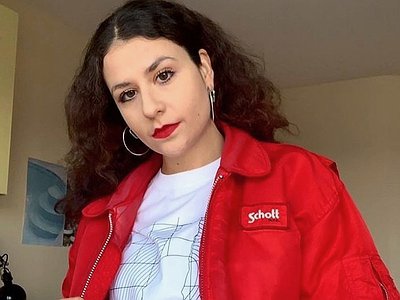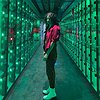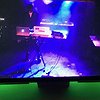There are many descriptions of the ideal state of mind for being creative. What is it like for you? What supports this ideal state of mind and what are distractions? Are there strategies to enter into this state more easily?
To me, being creative is more a way of life than a state of mind. Creativity can take so many forms and shapes, and it’s not necessarily through art. Someone creative will be creative in anything the do in life. I just had to state that because in a neo-liberal capitalist world being creative means being productive. This productivity to me has nothing to do with being creative. It is definitely not only working as in being productive, it’s only one way of that huge concept.
To answer the question, I have no proper formula, I follow my own inner flow. I can have ideas coming up to me at pretty much any time of the day or the night. So whenever I have this urge to create I just jump into it.
I have no control over my creativity and this can be tough when you have to produce for specific deadlines. I try to tame myself with schedules and reachable goals for each project.
Music and sounds can heal, but they can also hurt. Do you personally have experiences with either or both of these? Where do you personally see the biggest need and potential for music as a tool for healing?
My whole experience with sound is about healing. As I stated earlier, music was always a companion for me, and it helped me in so many ways. It’s usually through music that I experience most of my healing work.
I have specific albums and tracks that I listen to when I’m in any specific emotion. It is known that sound (vibrations) has healing powers since the dawn of times. It appears very clearly to me through my own experience of music, and I strongly believe that music is a way of connecting people together through emotions and vibrations but also connecting yourself to your deeper self.
There is a fine line between cultural exchange and appropriation. What are your thoughts on the limits of copying, using cultural signs and symbols and the cultural/social/gender specificity of art?
I believe that in a globalized world, the idea of boundaries, limits and territories is old-fashioned. One can use any culture or symbols as throughout different cultures and ages, they have evolved in meanings and appeared in many different civilizations.
Exchange is the root of humanity. From a very early age we started trading food and crafts. I think we have to always be careful and sincerely put interest into it to apprehend it in a respectful way. Fast trends around gender, cultures or origins as it’s been marketed nowadays is definitely not a fair way to do it.
Many people have their own fascination with specific periods of history, cultures or countries. If we have a true interest in the subject and dig into with acknowledging our own identity in this space, we can create a transversal/transcultural approach that can be very hybrid, and thus very contemporary by essence.
Our sense of hearing shares intriguing connections to other senses. From your experience, what are some of the most inspiring overlaps between different senses - and what do they tell us about the way our senses work?
Music has always made me have synaesthesias and this is how I started producing music. I would work on my experimental videos, and try to create overlaps of soundscapes that would make the spectator feel the movement of the image. It brings a lot of perspective for both the visuals and the sound itself.
Music, to me, was always accompanied by the sense of sight whether it’s colors, shapes, textures or lights. I have seen so many beautiful things by listening to ambient or experimental music for example. That’s what drew me so much to this style. When we enter the field of sensing, there are infinite possibilities of understanding things, in a non-verbal way. It brings a lot of freedom and inspiration in myself to have this association with music. It’s a very meditative state.
Art can be a purpose in its own right, but it can also directly feed back into everyday life, take on a social and political role and lead to more engagement. Can you describe your approach to art and being an artist?
I believe that artists, apart from producing artworks, should be political especially if they have the space or the community to do so. I try to integrate in my field of work - whether if it’s writing, installation or music - political positions and subjects that matter to me on a global scale. It is not necessarily political as governments, it means politics in a wider sense.
For my residency at Tikka Radio, I tried to describe the contemporary world as I live it through including political or theoretical discourses about life and the state of being in our world. I think we can always suggest a perspective through our own sensitivity and our work as artists. I believe it is deeply linked to how we experience the world, and the world is basically both social and political. It affects us whether we want it or not, we see it or not.
What can music express about life and death which words alone may not?
The depth and the variety of feelings that actually exist between life and death. That short moment of time we experience, that is so full of emotions and cycles. I’ve always found that language is very limiting.
Communicating emotions through language always felt so reductive and inaccurate. There aren’t enough words to describe precisely life; and thus death. I believe that the variety of sounds - and vibration - can express the widest spectrum possible in terms of feelings, moments and memories.




